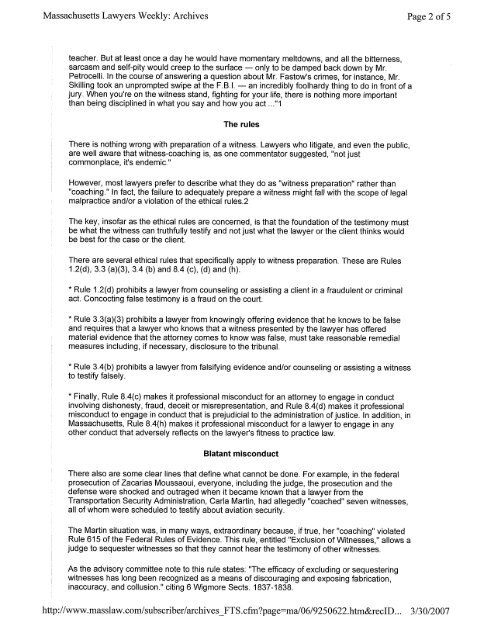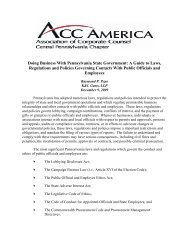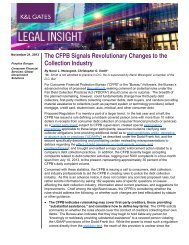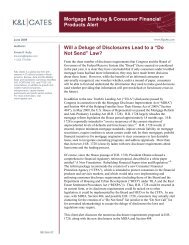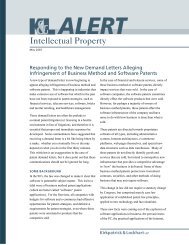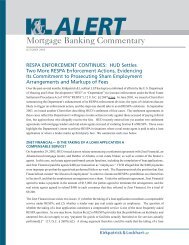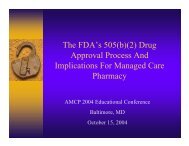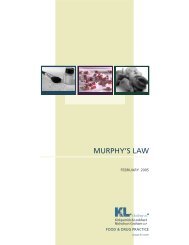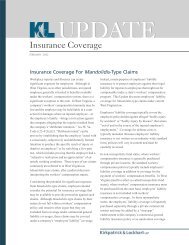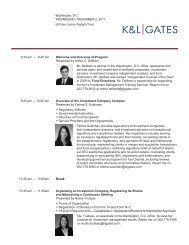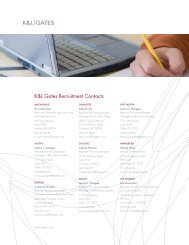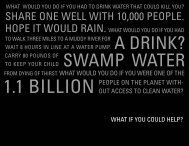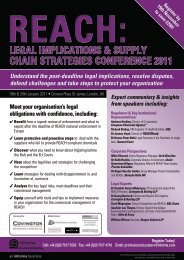Legal ethics of coaching witnesses: how far can you go?
Legal ethics of coaching witnesses: how far can you go?
Legal ethics of coaching witnesses: how far can you go?
Create successful ePaper yourself
Turn your PDF publications into a flip-book with our unique Google optimized e-Paper software.
Massachusett s Lawyers Weekly : Archives Page 2 <strong>of</strong> 5<br />
teacher. But at least once a day he would have momentary meltdowns, and all the bitterness,<br />
sarcasm and self-pity would creep to the surface -- only to be damped back down by Mr .<br />
Petrocelli. In the course <strong>of</strong> answering a question about Mr . Fastow's crimes, for instance, Mr .<br />
Skilling took an unprompted swipe at the F .B .I. - an incredibly foolhardy thing to do in front <strong>of</strong> a<br />
jury . When <strong>you</strong>'re on the witness stand, fighting for <strong>you</strong>r life, there is nothing more important<br />
than being disciplined in what <strong>you</strong> say and <strong>how</strong> <strong>you</strong> act . . ." 1<br />
The rules<br />
There is nothing wrong with preparation <strong>of</strong> a witness . Lawyers who litigate, and even the public,<br />
are well aware that witness-<strong>coaching</strong> is, as one commentator suggested, "not just<br />
commonplace, it's endemic ."<br />
However, most lawyers prefer to describe what they do as "witness preparation" rather than<br />
"<strong>coaching</strong>," In fact, the failure to adequately prepare a witness might fall with the scope <strong>of</strong> legal<br />
malpractice and/or a violation <strong>of</strong> the ethical rules . 2<br />
The key, ins<strong>of</strong>ar as the ethical rules are concerned, is that the foundation <strong>of</strong> the testimony must<br />
be what the witness <strong>can</strong> truthfully testify and not just what the lawyer or the client thinks would<br />
be best for the case or the client .<br />
There are several ethical rules that specifically apply to witness preparation . These are Rules<br />
1 .2(d), 3 .3 (a)(3), 3 .4 (b) and 8 .4 (c), (d) and (h) .<br />
* Rule 1 .2(d) prohibits a lawyer from counseling or assisting a client in a fraudulent or criminal<br />
act. Concocting false testimony is a fraud on the court .<br />
* Rule 3.3(a)(3) prohibits a lawyer from knowingly <strong>of</strong>fering evidence that he knows to be false<br />
and requires that a lawyer who knows that a witness presented by the lawyer has <strong>of</strong>fered<br />
material evidence that the attorney comes to know was false, must take reasonable remedial<br />
measures including, if necessary, disclosure to the tribunal ,<br />
* Rule 3.4(b) prohibits a lawyer from falsifying evidence and/or counseling or assisting a witness<br />
to testify falsely .<br />
* Finally, Rule 8 .4(c) makes it pr<strong>of</strong>essional misconduct for an attorney to engage in conduct<br />
involving dishonesty, fraud, deceit or misrepresentation, and Rule 8 .4(d) makes it pr<strong>of</strong>essional<br />
misconduct to engage in conduct that is prejudicial to the administration <strong>of</strong> justice . In addition, in<br />
Massachusetts, Rule 8 .4(h) makes it pr<strong>of</strong>essional misconduct for a lawyer to engage in any<br />
other conduct that adversely reflects on the lawyer's fitness to practice law .<br />
Blatant misconduct<br />
There also are some clear lines that define what <strong>can</strong>not be done . For example, in the federal<br />
prosecution <strong>of</strong> Zacarias Moussaoui, everyone, including the judge, the prosecution and the<br />
defense were shocked and outraged when it became known that a lawyer from th e<br />
Transportation Security Administration, Carla Martin, had allegedly "coached" seven <strong>witnesses</strong>,<br />
all <strong>of</strong> whom were scheduled to testify about aviation security .<br />
The Martin situation was, in many ways, extraordinary because, if true, her "<strong>coaching</strong>" violated<br />
Rule 615 <strong>of</strong> the Federal Rules <strong>of</strong> Evidence . This rule, entitled "Exclusion <strong>of</strong> Witnesses," allows a<br />
judge to sequester <strong>witnesses</strong> so that they <strong>can</strong>not hear the testimony <strong>of</strong> other <strong>witnesses</strong> .<br />
As the advisory committee note to this rule states : "The efficacy <strong>of</strong> excluding or sequestering<br />
<strong>witnesses</strong> has long been recognized as a means <strong>of</strong> discouraging and exposing fabrication,<br />
inaccuracy, and collusion ." citing 6 Wigmore Sects . 1837-1838 .<br />
http ://www.masslaw.com/subscriber/archives_FTS.cfm?page=ma/06/9250622.litm&recID . . . 3/30/2007


